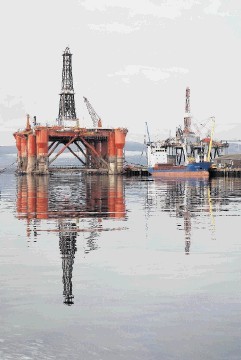
Oil & gas explorers, particularly small-caps, have always caught the imagination of the private investor attracted by potentially significant rewards. Exploration success is often greeted by rapid share price ascent; disappointment on the other hand can result in a ruthless sell-off.
AIM-listed Borders & Southern presents the starkest current example. After announcing abandonment of its Stebbing well in the Southern Falklands basin following the failure to find oil, Borders & Southern shares plummeted some 70% in a single trading session to only 18p per share, wiping £184million off the firm’s market capitalisation. Just three months earlier, the shares closed at an all-time high of 131p.
The fall was reminiscent of fellow Falklands driller Desire Petroleum when its shares halved in value in the space of a day back in 2010. Desire earlier reported it had discovered oil at its Rachel well; but a few days later, however, the company announced that it was to plug the well after confirming it was actually filled with water.
Even when exploration is successful, significant challenges remain in monetising the discovery. To date, Rockhopper has been the only Falklands player to have found oil in commercially viable quantities. After the initial Sea Lion discovery in early 2010, the shares rocketed from 49p to over 500p in just months. Since then the share price has progressively weakened (currently around 170p) as the sobering cost of development has hit home.
The traditional strategy for junior oil & gas explorers such as Rockhopper is to farm out or sell early-stage projects to larger companies thereby crystallising value for stakeholders. Indeed, Rockhopper recently unveiled the terms of a farm-out deal with Premier Oil. Premier will acquire 60% of Rockhopper’s North Falklands Basin licences for £149million in cash including Sea Lion where it is operator henceforth.
Presumably, investors were delighted that Rockhopper had gained a well-established operational partner with extensive expertise? Guess again. Rockhopper’s shares dropped some 9% on the announcement. It wasn’t just the Argentinean government left frustrated, many investors were disappointed by the value attributed and in particular the fact that Rockhopper had to sell so much of its key asset to ensure a deal.
The reaction from some investors bore similarities to Premier’s £221million buy of North Sea focused EnCore Oil & Gas in October. Although the 70p per share offer was a 55% premium to EnCore’s share price prior to the bid announcement it was well short of its 52-week high of 153p.
The EnCore deal is indicative of the financing constraints facing many junior oil & gas companies. With debt financing particularly difficult to obtain, such restrictions can leave successful explorers exposed to opportunistic bids.
Dominion Petroleum provides another example of the decline in sentiment toward cash-strapped explorers. After struggling to raise $40million last July, Dominion’s share price dropped substantially and the company was eventually taken out by larger rival Ophir Energy for £118.2million. Although the deal was concluded at a considerable premium to Dominion’s pre-bid share price, all but the earliest investors were left nursing heavy losses.
Even for those able to raise cash, often it has come at a price. Xcite Energy shareholders, for example, have had to accept a number of dilutions over the years as the company has raised incremental capital on equity markets.
Xcite announced a $155million reservoir-based loan in June with a consortium of lenders which should complete the majority of fund for its Bentley oilfield. That followed on the heels of other funding deals including £25.8million in a two-stage private placement with Socius Capital Group and a £60million equity credit line with Esousa Holdings – both dilutive to many longer-term shareholders.
The placing price of 85p per share with Socious was some way off Xcite’s share price of 300p in December 2010 when the company started the process of exploring debt and credit facilities.
Of course, it’s not all bad news; the current environment presents opportunities for well-funded small operators to acquire acreage on favourable terms. Parkmead Group, for instance, took advantage of share price fragility to complete a £12.7million all-paper takeover of DEO Petroleum in May.
The share price trends seen in Rockhopper and Xcite are common to many junior oil stocks. As mentioned earlier, huge upside potential exists for investors buying into junior oil & gas explorers and especially those with large equity positions. The danger for investors is that the market begins to overlook the potential and instead begins to focus on the finer detail such as development risk and access to funding which are fundamental to any share price discount.
There is an argument that farm-out agreements provide an industry confirmation of asset value. With debt funding expected to remain constricted for some time it’s likely that farm-out activity will increase. Investors in junior oil & gas explorers need to make sure they don’t get squeezed.
Stuart Lamont is investment manager, Brewin Dolphin Aberdeen
Disclaimer
Past performance is not a guide to future performance.
No investment is suitable in all cases and if you have any doubts as to an investment’s suitability then you should contact us.
The opinions expressed in this article are not necessarily the views held throughout Brewin Dolphin Ltd. No Director, representative or employee of Brewin Dolphin Ltd accepts liability for any direct or consequential loss arising from the use of this document or its contents.
We or a connected person may have positions in or options on the securities mentioned herein or may buy, sell or offer to make a purchase or sale of such securities from time to time. In addition we reserve the right to act as principal or agent with regard to the sale or purchase of any security mentioned in this document. For further information, please refer to our conflicts policy which is available on request or can be accessed via our website at www.brewin.co.uk